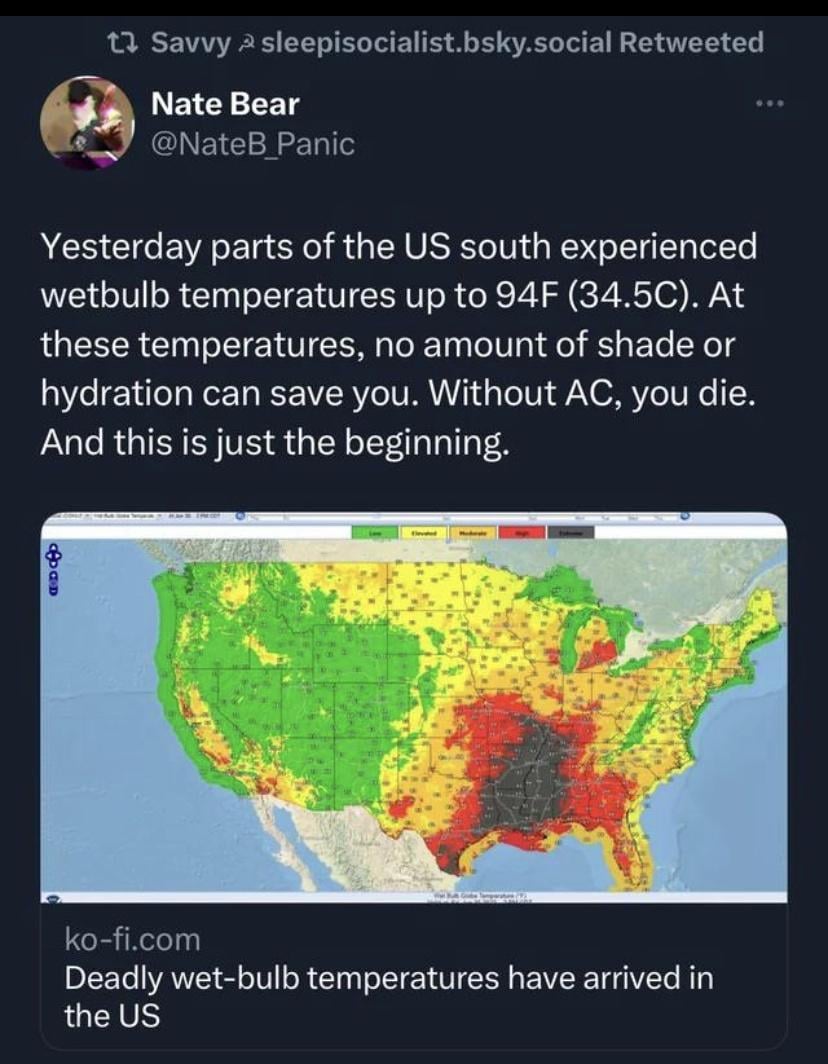this post was submitted on 03 Jul 2023
35 points (77.8% liked)
Prepper Forum
563 readers
2 users here now
Discsussions about prepping and preparedness, including disasters, prepping communities, sustainability, situational awareness, supplies, skills, gear. This is a forum about knowledge sharing.
founded 1 year ago
MODERATORS
you are viewing a single comment's thread
view the rest of the comments
view the rest of the comments

Shitty news yes, but if that temperature means "you die", why isn't everyone without AC in that zone dead? Sensationalism does no one's cause any good.
According to wikipedia, prolonged exposure to wet-bulb temperatures above 35 °C means that you die. So 34.5 °C is still slightly below that limit, and presumably this was only the maximum during one day, i.e. it wasn't prolonged. The problem arises when you can't cool your body at any point during the day for a few days, which I naively imagine to be similar in effect to running a high fever that just doesn't go down. And there is a serious risk that the temperature rise due to the climate crisis could lead to such conditions (several consecutive days with wet-bulb temperatures above 35 °C) regularly, especially in the tropics, if global mean temperatures rise by more than 1.5°C (see e.g. here). Besides, I wouldn't be surprised if quite a few (in particular old) people did in fact die due to the heat.
if you don't have AC, you need to get creative. you need to avoid being in that kind of heat and humidity, or lower the body temp through means other than evaporative cooling. if you can get underground, the temp will be lower, for instance. or you can get that underground coldness from your tap, and take a cold bath. strap ice packs to your body. whatever, but the situation is desparate.
anyways, there are ways to survive, but a wet bulb temp of 95F (equivalent to a heat index of about 160F) is considered the theoretical limit on human survivability, so it is unsurprising that people have died from this heat wave.
like @Bbshot said, this picture is for wet bulb GLOBE temperature which isn't the same as the deadly wet bulb temperature in the article. Lazy/uninformed at best, misinformation at worst.
You do not die immediately. Not sure about those areas but here in the PNW, when the temperature creeps up we have started having cooling stations for people who are not able to stay cool where they live. There were still a couple hundred deaths during the last big heatwave.
Basically people are not stationary. If they are too hot, they will find cooler places. Problems arise with people who are not as mobile (elderly) or if there is a major power outage.
The wet bulb temperature is not stationary, BTW. It is dependent on relative humidity. The temperature for it is going to differ in places like Arizona where it is higher compared to more humid places like SE Texas where it is lower. It's basically the temperature where your sweat is not able to cool you down.
I've been without AC in Seville on a rowing competition with +40C, so basically no shade while doing heavy activity. It's true that we went to drink water and to the shade the moment we unloaded the boats, and that there was a recommendation to stay inside just in case, bu there were no reported deaths in 3-4 days.
This was an extreme, 42C ish, but I've been on 32 or 34 and while it's really uncomfortable (more because of humidity than heat but oh well), it's not mortally bad.
40C by itself isn't life threatening if the humidity isn't as high. The temperatures on their own regarding this heatwave were about 38C, but with the high humidity, the heat index exceeded 49C. I'm seeing a death toll of at least 14 so far.